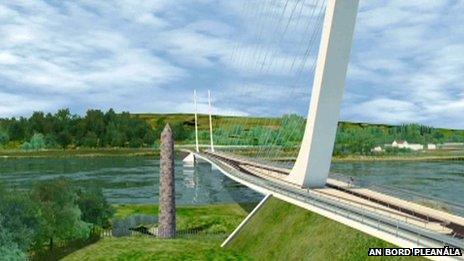European funding for Narrow Water bridge plan withdrawn
- Published

It was proposed that the bridge would link Northern Ireland and the Irish Republic at Narrow Water
European funding for a proposed cross-border bridge that would link counties Down and Louth has been withdrawn.
The Special European Union Programmes Body (SEUPB) had pledged £14.5m (17.4m euro) towards the Narrow Water project.
But it has withdrawn its offer because additional funding had not been found.
South Down MP, the SDLP's Margaret Ritchie, said she was "extremely disappointed" at the announcement.
A SEUPB statement said: "Following comprehensive discussions on the financial viability of the Narrow Water Bridge with the project's lead partner (East Border Region Ltd and Louth County Council), the SEUPB has decided to withdraw the letter of offer. The additional funding required to deliver the project has not been secured."
Ms Ritchie said: "I am extremely disappointed that the SEUPB find themselves in this position of withdrawing funding.
'Political will'
"I am still of the belief that the Narrow Water Bridge would be an important economic stimulus for the local area of south Down and County Louth in terms of job creation, investment and tourism opportunities.
"I would still hope that it would be possible for both governments together to bring forward a scheme for funding this important project."
She also questioned the timing of the announcement, which comes ahead of a meeting on the issue with Northern Ireland's first and deputy first ministers at Stormont on Monday.
Caitríona Ruane, Sinn Féin MLA for South Down, said: "The project can still go ahead in the near future if the political will exists.
"The funding necessary to make the bridge a reality was already in place. All that was needed was a commitment for a 6m euro (£5m) funding package from the Taoiseach (Irish prime minister) and the Department of Transport.
"At a time when the construction industry desperately needs investment this project can create 270 jobs for a relatively small investment by the government."
Focus minds
The proposed development was by Louth County Council in association with Newry and Mourne District Council.
The cable-stayed bridge, 195m (640ft) long, has been in the planning for at least five years and would have connected Cornamucklagh near Omeath, County Louth with Narrow Water near Warrenpoint, County Down, at an historic crossing point.
The entire build would have been 620m (2,040ft) long and it had been hoped it could be open by 2015.
Backers of the scheme claimed it was crucial to the prospects for economic regeneration and reconciliation of the border community in Louth and Down.
Declan Breathnach, chairman of Louth County Council, said the decision should focus minds.
"It was not unexpected. They are under severe pressure to spend," he said.
"I think this should focus the minds on what is a shovel-ready project and if people really want the bridge to happen, as three local authorities and the majority of public representatives do, then it will focus the minds in the Taoiseach's office and the Northern Ireland executive."
Elected representatives and politicians from both sides of the border attended a meeting at Louth County Council on Friday to confirm their continued support for the project.
Above budget
They have sought "urgent meetings" with the first and deputy first ministers and the Irish prime minister.
Stormont's finance department was the last body to commit to fund the scheme with £2.7m allocated to the bridge. In May, Finance Minister Sammy Wilson gave approval for the project on a number of financial conditions and undertakings from both Louth and Newry and Mourne councils.
In July, however, council bosses in County Louth pulled out after bids for the job from construction firms came in substantially above budget.
Narrow Water was the spot where a convoy of British paratroopers were blown up by a remote control roadside bomb in 1979. It was the Army's greatest loss of life in one day in the Northern Ireland Troubles with 18 soldiers killed.
The SEUPB said it was now looking to reallocate the funding to other eligible projects.
A spokesman added: "The SEUPB is now exploring options for the reallocation of this funding to eligible projects capable of being delivered by December 2015 to ensure that the drawdown of funds from the European Commission is maximised and that no money is lost to the Northern Ireland or Ireland economies."
- Published9 July 2013
- Published28 May 2013
- Published28 May 2013
- Published5 December 2012
- Published4 December 2012
- Published15 October 2012
- Published12 October 2012